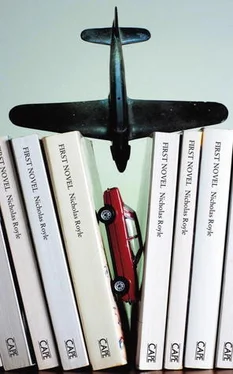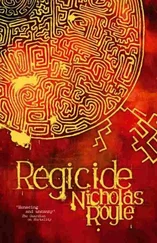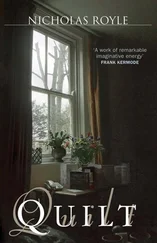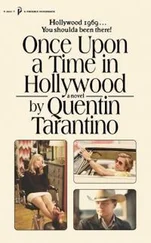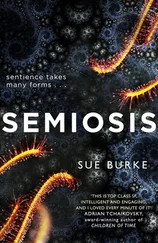‘He begged her to change her mind, said he was in love with her and without her he didn’t know how he would carry on. He told me all this. It was as if he thought by telling me, he was somehow making it better. But, you know, there was no making it better.
‘He claimed he told her that if she didn’t relent, he would kill himself and how would she like to live with that? She, at this point, according to him, told him to fuck off. I kind of admire that, whether in front of the girls or not. And she walked away — as you saw on the DVD. She’s walking away holding Emily’s hand. But Trevor sticks his own hand out and calls after Anna, because he’s picked up on the fact that she’s more sensitive than her sister. He plays on her emotions, making it look as if he’s simply offering a spin in his plane, while subtly letting her know that if she doesn’t help convince her mum to come back and at least talk to him, he’ll be as broken as the dead birds he knows she cries over in the garden. That was Mel’s fault for telling him that stuff.’
We’re at the base of the hill now and there’s a clear choice either to go around it or to start climbing. Lewis stops and stands with his hands on his hips.
His story is almost over.
‘So that’s how he tricks them into his plane. They take off and Mel is still telling him it’s over, even as she’s looking out and enjoying the view, or what she can see of it out of a Cherokee with the bloody wing in the way. He says he’s not saying much at this point, whether that’s because he’s hoping the experience will do his talking for him or because he believes her and has decided upon his course of action. He told me the latter, but I wasn’t convinced. I think he was trying to dig himself an even deeper hole than he was already in. Punishing himself as harshly as he could.’
‘What do you mean?’
‘They flew over the centre of town and then out here. Takes about fifteen minutes with a decent westerly wind behind you. He told me that he spotted this hill from two or three miles away and just made a beeline for it. Didn’t deviate from his path for a second, even when Mel and the girls started screaming. The subsequent investigation suggested otherwise, that a couple of vital components failed at the same time and the crash was much more likely to have been a tragic accident. That was the official finding, anyway, whatever he said. The thing was, there was compelling evidence for both propositions, expert evidence on the one hand and possibly unreliable testimony on the other.’
‘They crashed into this hill?’ I ask him.
‘On the other side. I come up here once a month or so.’
‘He was the only survivor?’
Lewis gives a small nod.
‘But they found the wreckage, presumably, and the bodies?’
‘Of course, but I keep hoping, you know. Have you ever read The Bell Jar ? There’s a line in it I find comforting. Gives me hope. “It worked around in the back of my mind like a needle in the body.”’
Lewis looks up at the hill, his eyes scanning the regular brush strokes of green grass blown in the same direction by the wind, looking for a glimpse of red or yellow. A scrap of material, a fragment of bone.
‘If someone said the tragic will always be the tragic, I wouldn’t object too much; every historical development takes place within the embrace of its concept.’
Kierkegaard
NICHOLAS WON A place to read languages at university.
At Queen Mary College, University of London.
He had talked to his nana and grandad about his desire to apply to London and they had said it was his decision. They were proud that he was going to university at all. He wanted to tell them he didn’t want them to think he was rejecting them by going to college in the city where his father was living, but he didn’t. He wanted to tell them that he loved them very much and that he appreciated all the sacrifices they had made for him. He knew that his father sent small amounts of money whenever he could, but he also knew that those contributions had been paid into a separate account to be made available to him when he needed it, and that all the cost of bringing him up had been borne by his nana and grandad. He knew that neither his nana’s part-time position as a dinner lady at a nearby school nor his grandad’s job working for SELNEC, one of the local bus companies, would have paid all that well, but he had never worn a dirty school shirt or a pair of socks with holes in them.
He was offered a place in an inter-collegiate hall of residence, Hughes Parry Hall in King’s Cross, so that he found himself mixing with medics and dental students and civil engineers as well as arts students like himself. London was so big and so full of different sources of excitement and amazement and entertainment and enlightenment, he couldn’t take it all in. Whatever he sampled, he knew there would be more of it and a hundred different choices besides. College was only part of what was on offer. He went to hear live music, to repertory cinemas that ran double bills and all-night shows, to exhibitions in art galleries you could have fitted his grandparents’ whole estate in, never mind their house.
His attendance record at college was not the best, but he was still on site, hidden away in an office in the union building writing reviews for the arts pages of the college newspaper, having discovered that not only could he do this, but it was also a good way to get to see films for free — and before they came out. He sat looking at his first byline — Nicholas Cross — so hard and with such intense excitement that he was surprised the paper didn’t ignite in his hands.
He arranged to see his father, who was now living above a shop in Camden Town. They didn’t meet there, but on the South Bank in the coffee bar of the National Film Theatre. Ray looked at the newspaper his son handed over and he felt almost intoxicated with pride, but also humble as he knew he could take no credit for his son’s accomplishments. He was grateful beyond words, however, that it was important to Nicholas to show him what he had done.
‘And — Dad,’ Nicholas said, becoming increasingly — surprisingly — comfortable with the nomenclature as he got older, ‘I’ve met a girl. Liz, a medical student.’
‘That’s great, Nicholas. Tell me all about her,’ Ray said, beaming. ‘I mean, if you want.’
Nicholas’ failure to turn up at college — for German lectures in particular — started to become a problem. He knew he should have done single honours French, but he’d wanted to impress his grandparents, wanted to pay them back, and foolishly opted for combined honours. His German was poor but he had a plan, to read all the set texts in English translation. Kleist, Kafka, Schiller, Böll — this stuff was relatively easy to get hold of. But the Goethe, surprisingly, was not available, and to make matters very much fucking worse, it was not available in roman script in German either, only in Gothic type.
He sat in his room one evening — the night before an essay deadline — trying to ignore the competing sounds of music playing in neighbouring bedrooms. The book lay open on his desk under the lamp. He stared at the bold, angular, spiky letters. The page looked like it had been created by someone in a secure ward with an italic fountain pen that was leaking ink. It might as well have been Arabic or Mandarin.
Maybe a drink would help?
He went down to the bar and stared at the range of drinks on offer. He was not a big drinker; he’d never really had the opportunity. The girl before him, a dental student from Guy’s, ordered a vodka and orange. He asked for the same, but the orange failed to mask the taste of the vodka, which was like some kind of foul-tasting blunt horn trying to force its way down his throat. He tried a gin and tonic. How could something utterly colourless taste so sharp and unpleasant? A vodka and grapefruit worked a little better and a gin and lime — with lots of lime — seemed to be the answer. It was important to have enough lime to hide the taste of the gin completely. You needed enough lime that it — the lime cordial itself — caught the back of your throat and made you cough.
Читать дальше
